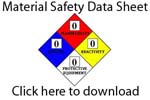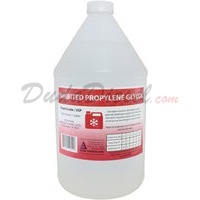Propylene Glycol may begin to break down and become acidic when it reaches temperatures of 250°F or more. As it becomes more acidic, it will attack metals that it comes in contact with. This leads to corrosion of the metals and eventually system failure. As a precaution, in solar water heater systems and other antifreeze systems, propylene glycol with inhibitors is used. These inhibitors coat the metals of the system to help protect them from the acidic propylene glycol. When the propylene glycol becomes too acidic though, it should be changed out with fresh inhibited propylene glycol to help maintain the system. For solar water heater systems, we recommend flushing the system after freezing temperatures are no longer a problem, and using straight water, since stagnation temperatures may be reached in the hotter summer times, which breaks down the propylene glycol.
Propylene glycol is a viscous, oily fluid which is commonly used in many products. We use it as an antifreeze in our solar water heating applications. Food grade propylene is safe for drinking and is non-toxic. If your system fails or leaks and mixes with your water supply, there is no need to worry about the effects from drinking it incase the leak is not discovered immediately. In the case of ethylene glycol, someone drinking the fluid risks the chances of poisoning and even death.
Propylene glycol also does not have corrosivity to metals like ethylene glycol does and it is better for the environment. It can be used as an antifreeze in many other applications such as automobiles and refrigeration.This product is commonly known as a Food Chill propylene glycol, widely used when involving foods and food refrigeration.
For antifreeze applications, we recommend using no more than a 60% by weight solution in distilled water. Water has a high specific heat capacity, so only the appropriate percentage should be use to prevent freezing and boiling. Excessive use of propylene glycol will cause the antifreeze to lose its ability to retain sudden increases in heat and often cause system failure, especially in vehicles. (This is the same rule for ethylene glycol as all) Use the following table as a guide for your antifreeze application.
Solution (% by mass) |
10 |
20 |
30 |
40 |
50 |
60 |
Freeze Temp (º F) |
26 |
18 |
7 |
-8 |
-29 |
-55 |
Boiling Temp (º F) |
212 |
213 |
216 |
219 |
222 |
225 |


This product is made in the USA. |


